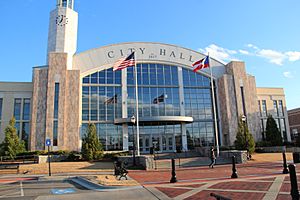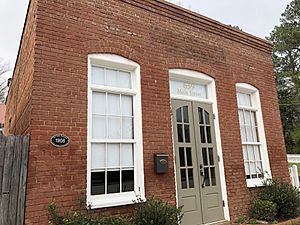Suwanee, Georgia facts for kids
Quick facts for kids
Suwanee, Georgia
|
|||||
|---|---|---|---|---|---|

Suwanee City Hall
|
|||||
|
|||||
| Motto(s):
"Crossroads of Past & Future"
|
|||||
| Country | |||||
| State | |||||
| County | Gwinnett | ||||
| Area | |||||
| • Total | 11.07 sq mi (28.66 km2) | ||||
| • Land | 10.99 sq mi (28.46 km2) | ||||
| • Water | 0.08 sq mi (0.20 km2) | ||||
| Elevation | 1,004 ft (306 m) | ||||
| Population
(2020)
|
|||||
| • Total | 20,786 | ||||
| • Density | 1,891.53/sq mi (730.29/km2) | ||||
| Time zone | UTC-5 (Eastern (EST)) | ||||
| • Summer (DST) | UTC-4 (EDT) | ||||
| ZIP code |
30024
|
||||
| Area code(s) | 770 | ||||
| FIPS code | 13-74936 | ||||
| GNIS feature ID | 2405551 | ||||
Suwanee is a city in Gwinnett County, Georgia, in the United States. It is part of the larger Atlanta metropolitan area. In 2010, about 15,355 people lived there. By 2020, the population had grown to 20,786.
Some areas outside the city limits also use Suwanee's ZIP code (30024). These areas are in Forsyth and Fulton counties.
Contents
Exploring Suwanee's Past and Present
How Suwanee Began
Suwanee started as a village for Native American groups. It was built near the Chattahoochee River, where communities thrived. The U.S. government officially recognized Suwanee as a city in 1837. This happened when a post office was built there.
In 1871, the Georgia Air Line Railroad was built through Suwanee. This brought more people and helped the city's economy grow. A hotel called the Rhodes House was built in 1880 for railroad passengers. In 1881, a fire destroyed most buildings on Main Street. For 40 years, from 1880 to 1920, the population stayed almost the same.
Suwanee's Growth Over Time
Important roads were built through Suwanee, helping it grow. Buford Highway was built between 1933 and 1936. In 1960, Interstate 85 was extended close to Suwanee.
Many schools have opened in Suwanee over the last 100 years. These include North Gwinnett High School and Suwanee Elementary School. The first Suwanee High School was a one-room schoolhouse in 1880. The city's first city hall was built in the early 1960s. A new one was built in 1997.
In 2005, a new area called Town Center was started. It was finished in 2009. The city hall moved there, and it is still there today. Suwanee has also been recognized for its efforts in being a great city and for caring for the environment. In 2003, it was named a "City of Excellence." In 2017, it became a "Green Community" for its commitment to protecting nature.
Suwanee's Location and Weather
Where is Suwanee?
Suwanee is located in the northern part of Gwinnett County. It also touches southeastern Forsyth County. The city of Sugar Hill is to its northeast. To the southwest is Duluth. The Chattahoochee River forms its western border. Across the river is the city of Johns Creek.
Suwanee covers a total area of about 11 square miles (28.4 square kilometers). Most of this is land, with a small amount of water. Some areas with a Suwanee mailing address are not actually inside the city limits. These are called unincorporated areas.
Suwanee's Climate
Suwanee has a humid subtropical climate. This means it has mild winters and hot, humid summers.
| Climate data for Suwanee, Georgia | |||||||||||||
|---|---|---|---|---|---|---|---|---|---|---|---|---|---|
| Month | Jan | Feb | Mar | Apr | May | Jun | Jul | Aug | Sep | Oct | Nov | Dec | Year |
| Mean daily maximum °F (°C) | 49 (9) |
54 (12) |
62 (17) |
70 (21) |
77 (25) |
84 (29) |
87 (31) |
86 (30) |
80 (27) |
71 (22) |
61 (16) |
51 (11) |
69 (21) |
| Mean daily minimum °F (°C) | 28 (−2) |
32 (0) |
38 (3) |
46 (8) |
55 (13) |
64 (18) |
68 (20) |
67 (19) |
60 (16) |
48 (9) |
38 (3) |
31 (−1) |
48 (9) |
| Average precipitation inches (mm) | 4.40 (112) |
5.24 (133) |
5.16 (131) |
3.68 (93) |
4.49 (114) |
4.00 (102) |
4.23 (107) |
5.28 (134) |
4.41 (112) |
3.73 (95) |
4.19 (106) |
4.41 (112) |
53.22 (1,351) |
People of Suwanee
Suwanee is home to a diverse group of people. In 2020, there were 20,786 people living in the city. These people made up 7,012 households and 5,235 families.
Fun Things to Do in Suwanee
Arts and Culture
The Gwinnett County Public Library has a branch located in Suwanee. It's a great place to find books and learn new things.
Sports in Suwanee
The Atlanta Falcons football team used to practice in Suwanee. They trained there from 1979 to 2001.
Parks and Outdoor Fun
Suwanee has many parks and green spaces for everyone to enjoy.
- Town Center Park: This 10-acre park is a popular spot for community events. It has an amphitheater for concerts and shows. The "Big Splash" fountain has 43 water jets and recycles its water. The park is next to the Suwanee Public Library.
- George Pierce Park: This is the largest park in Suwanee, covering 304 acres. It has fields for football, baseball, soccer, and softball. There's also a fishing pond, trails, picnic areas, and a playground.
- Suwanee Creek Greenway: This is a 4-mile paved trail perfect for walking, jogging, and biking. It goes through wooded areas with lots of wildlife.
- Suwanee Creek Park: This 85-acre park is great for family picnics. It connects to the Suwanee Creek Greenway.
- Playtown Suwanee: This amazing playground was built by 1,200 volunteers in 2004. Kids often call it "the playground my mommy and daddy built."
- Sims Lake Park: Opened in 2008, this park has a 7-acre lake with a looping trail around it.
- Suwanee Half Marathon: Every February, Suwanee hosts this race. It's a qualifying race for the famous Peachtree Road Race.
Walking and Biking
In 2016, Suwanee started the first Bike Share program in Gwinnett County. The city also has a plan to connect neighborhoods, schools, and businesses with trails and sidewalks.
Here are some of the major trails:
- Brushy Creek Greenway
- George Pierce Park Red Trail
- George Pierce Park Yellow Trail
- Ivy Creek Greenway (under construction)
- Suwanee Creek Greenway (under construction)
- Western Gwinnett Bikeway (under construction)
Learning in Suwanee
Suwanee is part of the Gwinnett County Public Schools district. Students in Suwanee mainly attend Collins Hill High School, North Gwinnett High School, and Peachtree Ridge High School. For higher education, the Georgia campus of the Philadelphia College of Osteopathic Medicine is also located in Suwanee.
Getting Around Suwanee
Main Roads and Highways
Airports Near Suwanee
The closest major airport for commercial flights is Hartsfield–Jackson Atlanta International Airport. This airport is south of Atlanta. For smaller planes, the nearest airport is Gwinnett County Airport.
Images for kids
See also
 In Spanish: Suwanee para niños
In Spanish: Suwanee para niños
 | Jessica Watkins |
 | Robert Henry Lawrence Jr. |
 | Mae Jemison |
 | Sian Proctor |
 | Guion Bluford |








